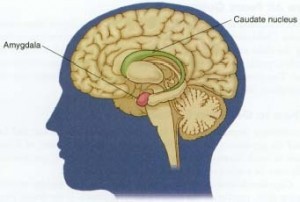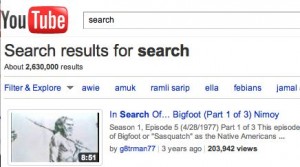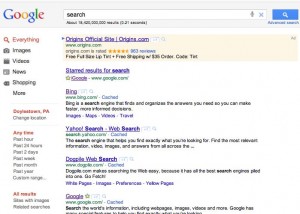Evolving Video Search: Value of Human Categorization

I love it when I see odd patterns through varied stimuli, and here is the latest. I’ve done my best to relate these disperate thoughts, but I’m growing increasingly skeptical of my ability to communicate the connections I see. Still I’ll try, and it has implications on video discovery, how they’re classified, what can motivate viewers and creators, and ultimately what YouTube, the largest video site and 2nd largest search engine is (teaser: I believe it’s more of a network than the video search platform it seeks to be).
I am aware that almost nobody will read 1200-word treatise, so I must have created it for myself. If I had more time, I’d refine it and actually make a salient point… but let’s get started with today’s inquiry and lesson!
- I awakened at 4 a.m. curious to finish watching this kickass presentation by Deborah Prentice at a live meeting of The Institute for Advanced Studies. Notice her hypnotic repetition of the word “popular,” which creates a cognitive pull. The central theme is that changing human behaviors is easy but often counter-intuitive. Many of her examples were familiar to me via Dan Pink, like the fact that statements about social norms can validate negative behavior or influence positive behavior. Give someone a moderate fine for picking up their kids late at daycare, and you’ll see an increase in that behavior (the “fine” allows parents to purchase a cheap ” free pass” from the guilt of a moral transgression). Likewise providing cash prizes to reward a behavior (donating blood, achieving in school) can often remove someone’s intrinsic reward… having the opposite of the intended effect. Simply put, little things can make a big difference (thanks Malcolm Gladwell for popularizing that encouraging notion with the seminal book, Tipping Point).
-

The red represents the part of your brain (amygdala) that is emotionally repulsed by the boredom of this post. Inspired by recently reading “Aspire” by Covey alumnus Kevin Hall, I’ve been curious about word etymology for terms we use daily. As a Johnson & Johnson colleague jokes, “words matter… because they mean things.” I’d go a step further and suggest that almost no word we use has truly universal meaning. What happens in your amygdala when I say ROCK is indisputably different than what happens to your best friend. I started this bullet with the word “inspired,” for instance. What did you hear? The word originates from Latin for “breath life” and even has some spiritual origins (infusing someone with God). For that matter, a “coach” didn’t originate to mean “someone who pushes you to achieve your highest potential,” but “someone who takes you from where you are to where you want to be” (origin: the region in Hungary, Kocs/kocsi, where stage coaches originated). “Life coach,” a more recent term, is probably truer to that definition than the coaches we remember from agonizing athletic moments. Simply put, since words have varied meaning, the “law of averages” suggests that even slightly MORE categorization words can increase precision.
- While presenting at the Institute for Humor Studies, someone asked about who “classifies” a video’s topic… I explained that the creator did. Not the viewer. NOT the viewer. It made me pause because it’s actually quite arrogant to think I can classify my video better than a dozen viewers. Lesson: the category has an inherent bias by the creator: its intention might be radically different from the way it’s received, and we viewers should help decide if it’s actually “comedy” or “education.” Furthermore we need to get far more specific than these arbitrary and broad categorizations.
- Finally, Jan, a long-time member of the WVFF “back row” (the people brave enough to comment below, and tell me to stop being so damned long-winded and random like this post). Jan writes, “It’s a shame you tube doesn’t have something in the profile settings that allows users to list what your channel is about that connects directly to an index with a list of categories.”
- People could find the right content with greater ease. As Jan observes, one could search Genre: LOL, Topic: Slapstick, Subcategories: farts, boob, damaged genitalia, Ages: 14 up. Then you’d “mouse over” the creator or video to read a 144-character description such as “me and ma homies are crakin’ it up /w stuff that makes you silly LOL.” This could be crowdsourced or creator driven.
- By asking the creator to specify the video, it would provide them further clarity on their “category,” which is derived from the Latin “categoria” or Greek “katagegorein” (and these ironically meant “to speak against, declaim or accuse.” This could provide a “feedback loop” to the creator that might be more constructive than the comment “I’d like to defecate in your mouth” (one of my favorite viewer-generated responses.
- By inviting the user/viewer to co-categorize, we’d increase the accuracy of a video search. Humans know the difference between “Tom Cruise” and “Cruise missiles,” and Google seems to do better at emulating that than YouTube.
- Google is trying to organize the world’s information, yet is failing mostly in the field of video. Until technology can transcribe the spoken word and detect visuals contained in a video (right down to facial coding), we’ll need human workarounds.

Percentage of search aside, the quality of video search is simply not as “smart” as Google. So we have a vicious cycle or what Prentice might call a “negative feedback loop.” Video search (for me) is declining as a percentage of how my videos are “discovered” perhaps because search isn’t effective. And unless my videos are an anomale (and the rest of videos are indeed search driven) we might not see the emphasis on improving it. Certainly this will change as advertisers disproportionately reward video views driven by search: for instance, if I’m marketing a medication for “restless leg syndrome” I’m far more interested in targeting those people searching “restless leg syndrome medications” on YouTube than those watching Ray William Johnson. Even if viewing him my cause restless leg syndrome.


Okay. Im not saying i’ll NEVER read it. Just let me score a couple tabs of acid first.
I asked a YouTube employee about their search functionality at the London “Rising stars” event they ran… His response was that the reason for the difference in search between google and youtube is because of the search terms used on the two sites.
He said that on google people type (for instance) “new song by Lady Gaga”. But on youtube people just type “Lady Gaga”. He said that because of the vague nature of the input by people searching on YouTube it has to do more guesswork as to what you want as the answer (if that makes sense?).
Nice post btw!
I read this whole thing.
1. because I’m on hold with my local government and 2. cause I was mentioned in this post.
now just imagine how many you tube categories I could have been going through, as I sit here on hold, discovering new and interesting people, for later viewing of course, after I read this blog.
and I guess I’ll have to read this again, since I’m still on hold, instead of clicking on youtube and discovering new and interesting people.
btw Kevin tags work too, and I don’t believe for a moment you sat through that whole presentation by Deborah Prentice. Finally, a little piece of advice, when reading the comments on your videos, keep you mouth closed, just in case, I know I do.
wow, sukatra’s in a good mood.
If people don;t tag and describe their videos properly, then the search does not work. There would need to be some sort of Artificial intellegence to go through each video and tag it properly. That’s what Google does to web, but with Text.
I think they shalll call it skynet.
This should go on reelseo yeah?
YouTube Needs to really Expand their Categories and Sub-Categories. More Videos and Channels would get more Exposure instead of the Top ViewCounts always Dominating.
It sounds easy, but it affects so much.
Going back and re-categorizing videos. Other sites that are Upload tools, Like TubeMogol, would have to adjust.
Maybe they have something in the works.